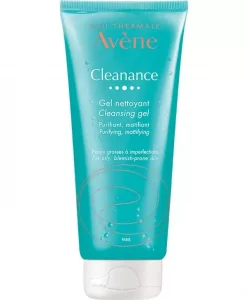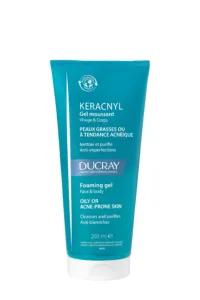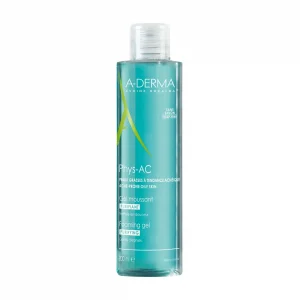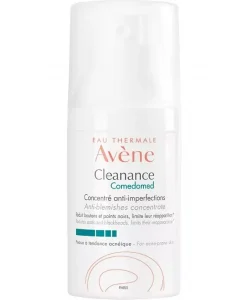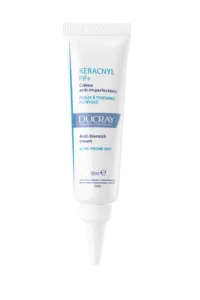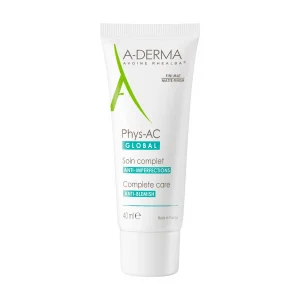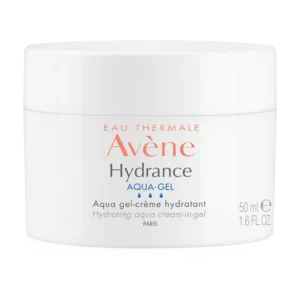
Acne, the much-feared skin condition that haunts many of you, can be a real confidence killer. The good news is that there are countless skincare products on the market specifically designed to combat acne. However, the number of options can be overwhelming, making it difficult to choose the right products for your acne-prone skin. Never fear: in this article from The Dermo Lab, we’ll unravel the mysteries of acne skincare and provide expert guidance on how to choose skin care products for acne, helping you make informed decisions to achieve clear, glowing skin.
What ingredients should be avoided in the fight against acne?
1- Synthetic fragrances
The truth about skincare products is that the words “fragrance”, or “perfume” on an ingredient list can often mean a mixture of dozens of chemicals, each of which can be irritating to acne-prone skin. Synthetic fragrances are a major source of skin allergies. They can cause inflammation and irritation, making acne treatment even more difficult than it already is.
2- Essential oils
Many “natural” skincare ranges contain massive quantities of essential oils, many of which can irritate already inflamed skin. Essential oils are highly concentrated compounds that can be irritating if applied directly to the skin (which is why we recommend diluting them in a carrier oil before applying).
3- Sodium Lauryl Sulfate
SLS, while effective in creating that commercial foam with your cleanser, can be a cause of irritation for people with sensitive skin. SLS is a surfactant (the chemical responsible for removing dirt and oil from the skin) known to cause severe irritation and inflammation. It can disrupt the skin barrier and aggravate rashes.
4- Isopropyl myristate and isopropyl palmitate
Isopropyl myristate is a penetration enhancer that increases the absorption of active ingredients into the skin. Isopropyl palmitate is a highly comedogenic emollient ingredient used in some moisturizers.
5- Alcohol
When used in toners and exfoliating products, which are applied all over the face, specific forms of alcohol become drying and irritating to the skin’s overall health: they remove excess sebum from the skin. They are potentially irritating, especially if you have drier skin.
6- Sodium chloride
Also known as sea salt, sodium chloride is the technical term for salt. It is commonly used in cleansers for its exfoliating properties and its ability to thicken formulations to achieve the desired texture.
How can you get clear, radiant, acne-free skin?
- Understand your skin type:
You need to know your skin type before you start buying skincare products. Acne-prone skin can be oily, dry, or a combination of both. Identifying your skin type will guide you towards products that meet your specific needs. For example, if your skin tends to be oily, look for non-comedogenic, oil-free products, as they won’t clog your pores.
- Look for gentle cleansers:
A gentle cleanser is the foundation of any effective skincare routine for acne-prone skin. Avoid harsh soaps or cleansers that strip your skin of its natural oils, as they can exacerbate acne. Instead, opt for a gentle, fragrance-free cleanser that will clean your skin without causing irritation.
Our choice of products:
Eau Thermale Avène Cleanance Cleansing Gel
Ducray Keracnyl Foaming Gel
A-Derma Phys-AC Foaming Gel
- Incorporate treatment products:
Incorporate topical treatments that target acne. These can include benzoyl peroxide, which kills acne-causing bacteria, and topical retinoids, which help regulate skin cell turnover and reduce inflammation.
Discover 3 acne treatments that will clear up your skin below.
Eau Thermale Avène Cleanance Comedomed
Ducray Keracnyl PP+ Anti-Blemish Soothing Cream
A-Derma Phys-AC Global
- Don’t neglect moisturizing:
One of the most common misconceptions among people with acne-prone skin is that moisturizers should be avoided. In reality, even acne-prone skin needs moisturizing. Keep your pores clear by choosing non-comedogenic, oil-free moisturizers. Hydrated skin is better equipped to fight acne and heal existing imperfections.
Our choice of products:
Eau Thermale Avène Hydrance Aqua-Gel
- Sunscreen is non-negotiable:
Whatever your skin type, sun protection is a non-negotiable step in any skincare routine. Acne-prone skin can be sensitive, and sun exposure can aggravate inflammation and cause post-inflammatory hyperpigmentation. Make sure to apply sunscreen generously, even on cloudy days, with a broad-spectrum SPF of at least 30.
Our pick:
Eau Thermale Avène Cleanance Sunscreen SPF 50+
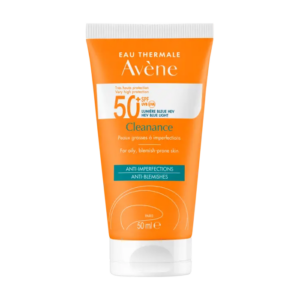
- Be patient and consistent:
Getting clear skin takes time and consistency. It’s tempting to try several products in quick succession, hoping for immediate results. However, this approach can further irritate your skin and upset its natural balance. Instead, introduce new products gradually, giving your skin time to adapt. Consistency in your routine is essential; stick to your skincare regimen even if you don’t see immediate results.
- See a dermatologist:
If your acne persists despite your best efforts, or if you experience severe breakouts, it’s time to consult a dermatologist. He or she can assess your skin, identify the underlying causes of acne, and prescribe appropriate treatments, including topical products or oral prescription medications.
- Take care of yourself:
Finally, don’t underestimate the importance of taking care of yourself to achieve healthy, glowing skin. Stress and lack of sleep can cause hormonal imbalances that can lead to acne. Practice relaxation techniques such as yoga or meditation, get enough sleep, and adopt a balanced diet. Taking care of your general well-being has a positive effect on your skin.
Conclusion
In conclusion, choosing the right skincare products for acne-prone skin means understanding your skin type, using gentle cleansers, and targeted treatments such as salicylic acid, moisturizing, using sunscreen, being patient and consistent, and seeking the advice of a healthcare professional if necessary. Additionally, when selecting products for acne, it’s crucial to consider how to choose skin care products tailored to combat breakouts. Look for labels indicating “non-comedogenic” to avoid pore-clogging ingredients, opt for formulas designed for sensitive skin, and prioritize products containing acne-fighting ingredients like benzoyl peroxide or tea tree oil.
By following these tips and taking care of yourself, you can confidently navigate the world of skin care products, paving the way for clear, healthy, glowing skin.
There are many different skin types, and what works for one person may not work for another. Listen to your skin, be patient, and enjoy the progress you make. Your skin deserves the best care!
Last Updated on April 18, 2024
